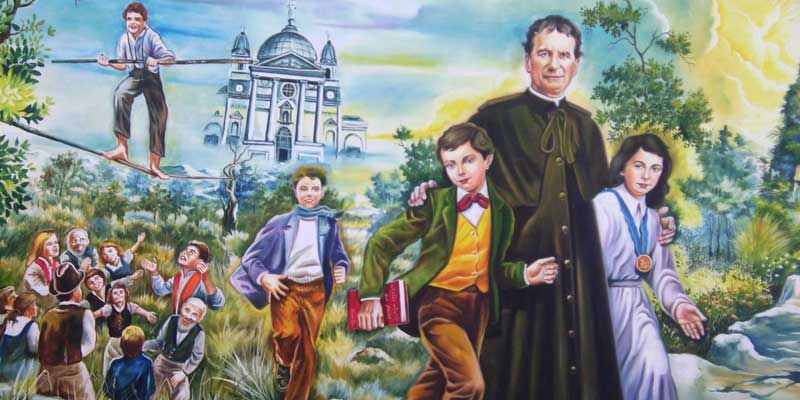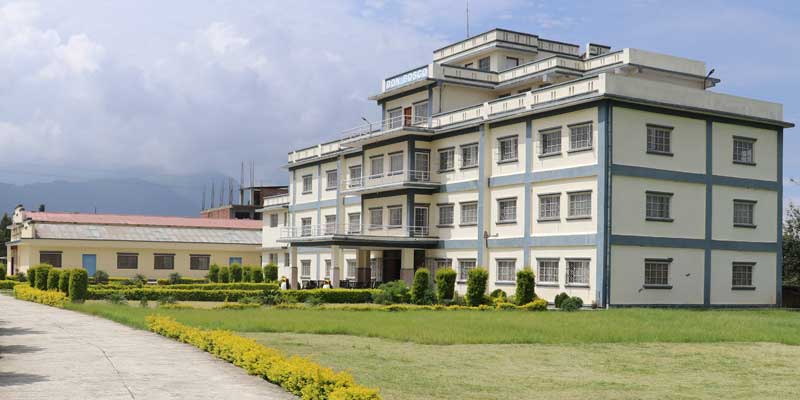
Welcome to our Institute
St. John Bosco, or, as he is commonly called, 'Don Bosco' (the Italian word 'Don' meaning Father), was born at Becchi, a town in the foothills of the Italian Alps, on August 16, 1815. His father died when he was two and his childhood and first years of study were filled with difficulties which include supporting himself while attending school. He overcame this problem by working at various trades, all of which he later taught his students. Don Bosco entered the Chieri Seminary and was ordained in 1841. He was stationed inTurin, an industrial center which attracted young people from neighboring towns. There he opened an 'œoratory' or boys club for them. Although he did not hesitate to extend his priestly services to prisons and reformatories, he gradually came to realize that his mission was to prevent youngsters from falling into crime rather then rehabilitate delinquents. Because of this insight, he opened his oratory (youth centre) to all boys. Soon, as many as 1,000 boys flocked to his oratory (which was just an open field and a chapel shed) every Sunday for religious instruction, Holy Mass, sacraments and a full day of fun and games. Kindness, understanding and endless patience brought these boys close to their faith.Realizing that many young people needed continuous help, he enlarged the youth centre into a boy's home. There, youngsters could live and either work or attend classes in the city. To prepare boys for skilled labor, Don Bosco turned his mother's kitchen into a makeshift cobbler and carpenter shop. This was the first Catholic trade school inItaly(1835).
Leading educators soon came to admire DB’s educative style, which he explained as a happy blend of reason, religion and loving kindness. He strove to establish a family atmosphere characterized by a sense of understanding between teacher and pupil and an acknowledgment of life's spiritual aspects. Thus, he not only prevented delinquency but also produced leaders for industry and labor god-loving men and honest citizens. In 1859, at the insistence of Pope Pius IX, Don Bosco founded a religious congregation of priests and brothers, which he named Salesians, after St. Francis de Sales. This order was officially approved in 1874, and is known as Salesians of Don Bosco. A tireless worker, Don Bosco died on January 31, 1888, inTurin,Italy, at the age of 72. He was canonized in 1934 by Pope Pius XI. Don Bosco’s birth bi-centenary is in 2015.

Donbosco ,Nepal History..
Nepal Don Bosco Society is a Registered NGO run by the Salesians of Don Bosco, a Catholic Religious Institute. Nepal Don Bosco Society was registered with the Kathmandu District Administration on 14 August 1996 (later transferred to the Lalitpur District Administration on 18 February 2014) and affiliated to the Social Welfare Council of Nepal on 14 December 1999. It forms a part of the International Don Bosco Society which is present in 136 countries worldwide and is headquartered in Rome, Italy. The Nepal Don Bosco Society falls under jurisdiction of the Salesian Province of Kolkata, India, for its general administrative work.
Seeking to promote the education of poor young people in the Kathmandu valley and Nepal’s outbacks, Nepal Don Bosco society began its work in 1999 with a high school at Siddhipur, a village within Lalitpur District. A small hostel was begun in 2002 for poor children from remote villages.
For the benefit of the many school dropouts in the region, a vocational training institute was started at Thecho, a Kathmandu suburb situated 7kms from the city centre. What began in 2001 as a modest computer centre has today grown into a full-fledged Technical Training Institute that offers Basic Computer Application, Computer Graphics, Tally Accounting, Computer Hardware, Electrician, Industrial Electrician, Mobile Repairing, Tailoring and Fashion, Apparel and Life Style Design, housed in a spacious building equipped with modern facilities.
Nepal Don Bosco Society at Thecho has a coaching centre for poor children from classes I through VIII. About 220 students attend free coaching classes from 4.00PM till 6.30PM, six days a week under the loving guidance of six teachers.
In keeping with the society's objectives, it has undertaken scores of social outreach programmes. In the post-earthquake days of 2015, the society sprung into action with relief measures, provision of temporary learning centres (TLCs) in about 20 affected districts and construction of 10 government schools in four districts. As a rehabilitation measure the Don Bosco Technical Institute provides skill training to hundreds of young people.